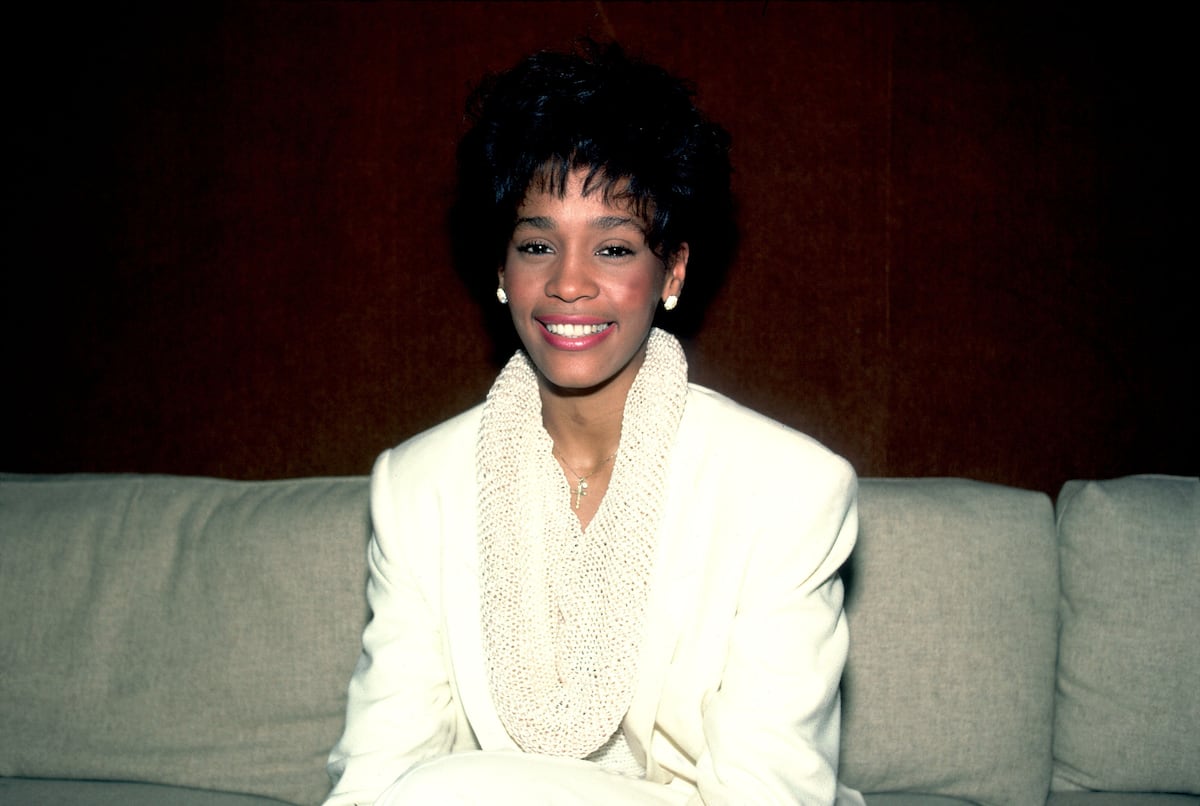On April 5, 1986, one of the most infamous moments in television history took place, when Serge Gainsbourg told Whitney Houston, “I want to fuck you!” The show was Champs-Élysées, France’s top-rated late-night program, and the American singer was still virtually unknown in Europe at the time. What’s less often remembered is that, just before the incident, Houston had performed Saving All My Love for You on set. It was the first single that took her to No. 1 in the United States (on October 26, 1985, to be exact), and its story is more complicated than its syrupy tone might suggest.
Whitney Elizabeth Houston was the niece of Dionne Warwick and the daughter of soul and gospel singer Cissy Houston and John Russell Houston Jr., a former soldier who later worked in the administration of Kenneth Gibson, the first African American mayor of a major U.S. city. Her parents separated when Whitney was 17, and it was Cissy who managed her career with an iron hand. She began singing as a child in the church choir, and at 14 her mother invited her to join her live performances in Manhattan — earning Whitney her first standing ovations.
After a talent agent spotted her at Carnegie Hall, she briefly pursued a career as a teenage model, appearing in magazines such as Seventeen, Cosmopolitan, and Glamour. But Cissy was determined not to rush things. Even as record deal offers began to pour in, she turned them all down until Whitney finished high school. In 1981, she hired Gene Harvey as her manager, who landed her some rather unusual collaborations — including Memories with the cult group Material, led by avant-garde musician Bill Laswell. It was her first appearance as a lead vocalist on a record, and The Village Voice critic Robert Christgau called it “one of the most gorgeous ballads you’ve ever heard.”
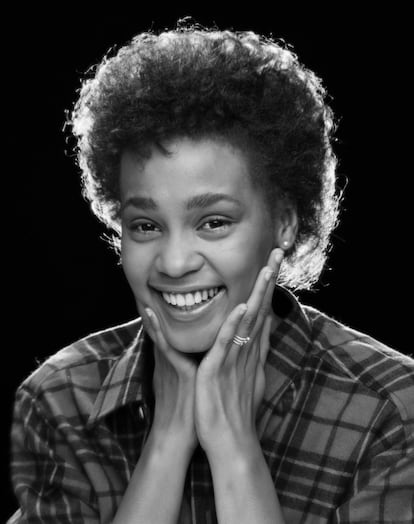 Whitney Houston poses as a model in 1982, while still in high school.
Whitney Houston poses as a model in 1982, while still in high school.
Jack Mitchell (Getty Images)
In 1983, after seeing her perform at a concert, Arista Records’ owner Clive Davis was blown away and offered to sign her. Whitney was 19 at the time but signed the contract in the presence of her parents. Around that period, she was also offered the role of one of the Huxtable daughters on The Cosby Show, but she decided it might conflict with her burgeoning music career and turned it down.
A soaring career and two secret romances
Whitney Houston’s debut album was carefully crafted over two years. During that time, she recorded duets with R&B stars such as Teddy Pendergrass and Jermaine Jackson. It was also then that rumors began circulating about a romance with Jackson — who was nine years her senior and married to Hazel Gordy, daughter of Motown founder Berry Gordy. The self-titled album Whitney Houston was released on February 14, 1985, but initially received little attention, as did its first single, You Give Good Love. Saving All My Love for You was the second single, released in June, though the song’s origins go further back.
In late 1983, Clive Davis invited composer and producer Michael Masser, who had written hits for Diana Ross, George Benson, and Barbra Streisand, to a private industry showcase. Masser was amazed when he heard Whitney perform a version of Greatest Love of All, a 1977 song he had originally written for George Benson to perform in The Greatest, a Muhammad Ali biopic. He was so impressed by her rendition that he agreed to re-record it with her, along with another of his older compositions, Saving All My Love for You. This song had first been recorded by Marilyn McCoo and Billy Davis Jr. in 1978, but Masser felt Whitney’s interpretation gave it far greater emotional power — he literally said the song would “make women cry.” The label was initially skeptical about releasing it as a single, but Masser insisted and made a bet with Davis: if, at her next concert at the Roxy in Los Angeles, all the women stood up at the end of the song, they would promote it.
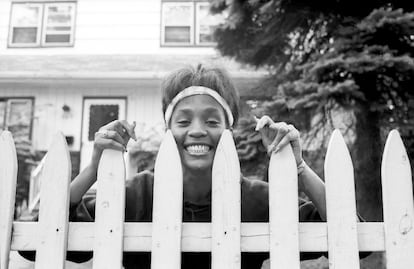 Whitney Houston photographed in 1985 at her mother’s house in New Jersey.Jack Vartoogian/Getty Images (Getty Images)
Whitney Houston photographed in 1985 at her mother’s house in New Jersey.Jack Vartoogian/Getty Images (Getty Images)
Whether that actually happened or not is unclear, but the song was released as a single. A music video was shot in London, which quickly entered heavy rotation on MTV — a channel that at the time largely excluded soul and R&B from its general programming, airing such clips only on specialized shows.
Simultaneously, her label secured appearances on late-night TV, culminating in the decisive moment: her performance on Late Night with David Letterman on September 12. There, Whitney radiated stage elegance and vocal fireworks that avoided empty showmanship, exploring subtle interpretive nuances ranging from vulnerability to intimate longing, from self-assertion to the force of irresistible desire, and even the melancholy for what, in reality, was impossible.
The song tells the story of an affair, narrated from the perspective of the mistress. Paradoxically, the protagonist is more faithful to her unfaithful lover than he will ever be to her. “A few stolen moments is all that we share / You’ve got your family and they need you there / Though I’ve tried to resist being last on your list / But no other man’s gonna do / So I’m saving all my love for you.”
In the finale, the protagonist resigns herself to focusing on the passionate moments awaiting her at their imminent secret rendezvous: “I’ve got to get ready just a few minutes more / Gonna get that old feeling when you walk through that door / Cause tonight is the night for feeling alright / We’ll be making love the whole night through / So I’m saving all my love for you.”
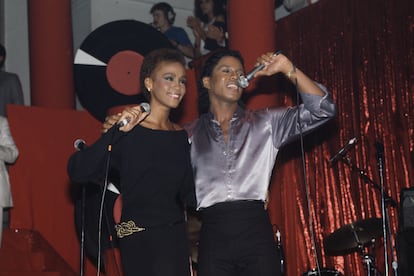 Whitney Houston and Jermaine Jackson at The Limelight nightclub in New York City in 1984.Dave Hogan (Getty Images)
Whitney Houston and Jermaine Jackson at The Limelight nightclub in New York City in 1984.Dave Hogan (Getty Images)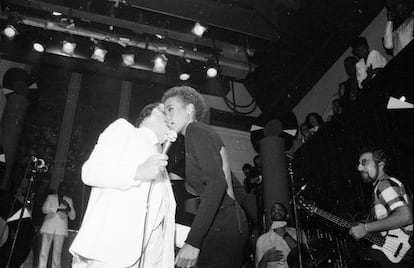 Clive Davis introduces Whitney Houston to the public in 1984 at a New York nightclub.Michael Ochs Archives
Clive Davis introduces Whitney Houston to the public in 1984 at a New York nightclub.Michael Ochs Archives
The song didn’t sit will with her mother, Cissy, who could not stand to see her daughter performing that role. What she didn’t know was that Whitney was actually putting a lot of her own life into it, drawing inspiration from what was happening with Jermaine Jackson at the time.
The singer did not acknowledge it in her initial statements, but admitted it later. ““I was going through a terrible love affair. He was married, and that will never work out for anybody,” she said. The former Jackson 5 member elaborated further on their relationship in his book You Are Not Alone: Michael Through a Brother’s Eye: “These were turning into duets between temptation and forbidden love […] I arrived on those days with butterflies, because the whole experience of being around Whitney was intoxicating […] it became increasingly hard to sing love songs with all that emotion and unspoken passion between us.”
Jermaine also revealed that his brother Michael had advised him against pursuing an intimate relationship with Whitney. “He didn’t fuel the temptation as some guys would,” the musician wrote. Significantly, in the end of the music video, the male character — played by Ricco Ross, an actor who bore a strong physical resemblance to Jackson — returns to his wife while the protagonist disappears into the cold London streets. Adding further irony, the B-side of the single featured a duet with Jermaine titled Nobody Loves Me Like You Do.
In reality, Houston’s love life was much more complicated. During her adolescence, she formed a close friendship with a girl named Robyn Crawford, who later became her personal assistant and roommate, and with whom she had a sexual relationship until her career took off and Whitney decided to end it. At the time, the music industry — as other stories like George Michael’s show — was deeply homophobic. According to Crawford’s autobiography A Song For You, after Whitney signed her first contract with Arista, she went to Crawford’s house, gave her a Bible, and told her they had to stop having sex, “because it would make our path even harder. If they find out, they will use it against us.”
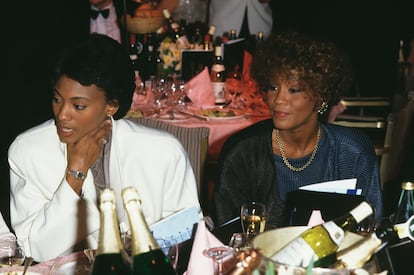 Robyn Crawford and Whitney Houston in 1988.Dave Hogan (Getty Images)
Robyn Crawford and Whitney Houston in 1988.Dave Hogan (Getty Images)
Their relationship, however, was an open secret that Whitney always insisted on denying publicly, as seen in a 1988 EL PAÍS article by Santiago Alcanda, which cited statements from a press conference in London: “People see Robyn and me and draw their own conclusions. But who cares if I’m gay or if I like dogs? Let them talk, it doesn’t bother me, because I know I’m not gay.”
Robyn also struggled with Whitney’s relationship with Jermaine Jackson — so much so that she could have written her own version of Saving All My Love For You. “The physical part of our friendship was no longer, but the intimacy… our friendship was intimate on all levels, that’s how deep it was, and I wanted her to call me and say, ‘Guess what, this is happening [with Jermaine].’ And she wasn’t doing that, and that hurt more than anything. It didn’t feel like she was cheating on me — it felt more like she was leaving me out,” she wrote years later.
The first of seven number ones
After the Letterman performance and on the eve of her concert at Carnegie Hall, Saving All My Love For You reached number one in the U.S. (also topping the charts in the U.K., Ireland, and Luxembourg), going on to sell a million copies and earning Houston a Grammy. It marked not only the rise of a megastar but also established the concept of the pop-soul diva that later inspired artists like Mariah Carey, Celine Dion, and Adele, in contrast to the Madonna model, which relied more on visual presence, provocation, and choreography. Whitney also eclipsed contemporaries Anita Baker and Janet Jackson as the most important Black voice of her time.
Between 1985 and 1987, she had seven consecutive number-one hits in the U.S., a record that surpassed the Beatles and has yet to be broken. The following singles to reach the top were How Will I Know, Greatest Love Of All, and, from her second album, I Wanna Dance With Somebody, Didn’t We Almost Have It All, So Emotional, and Where Do Broken Hearts Go. The record Whitney Houston remains the best-selling debut album by a female artist worldwide (exceeding 25 million copies), and it would still be five years before she made her definitive mark with I Will Always Love You, popularizing melisma as the most imitated vocal technique on talent shows across the globe.
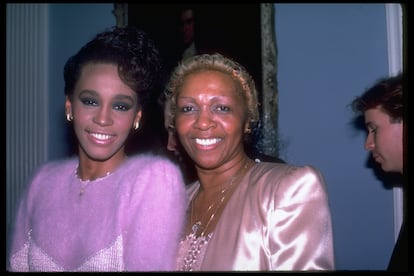 Whitney Houston with her mother Cissy.Robin Platzer (Getty Images)
Whitney Houston with her mother Cissy.Robin Platzer (Getty Images)
Beyond her musical achievements, perhaps what has lingered most about Whitney Houston is the somewhat sensationalist coverage of her downfall and tragic end. Yet the extraordinary breadth of her legacy as a pop icon has not been fully recognized. She is, in fact, the only singer who — besides being verbally harassed by Serge Gainsbourg on a live prime-time show — also holds the peculiar distinction of being admired both by Osama bin Laden (who was rumored to have wanted her as one of his wives) and Donald Trump (who has promised to erect a statue of her in his National Garden of American Heroes project).
Perhaps all of this was already foreshadowed by Bret Easton Ellis in his novel American Psycho (set in 1989), when its protagonist, the yuppie psychopath Patrick Bateman, simultaneously expressed his admiration for Trump and Whitney, praising the string of number-one hits the singer had achieved. Pop history, in every sense of the word.
Sign up for our weekly newsletter to get more English-language news coverage from EL PAÍS USA Edition

